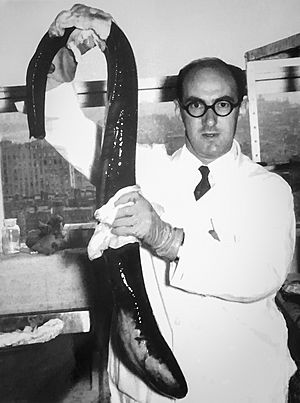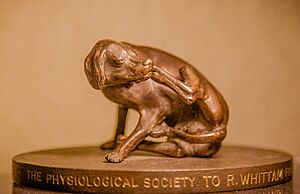Ronald Whittam facts for kids
Quick facts for kids
Ronald Whittam
|
|
|---|---|
 |
|
| Born | 21 March 1925 Chadderton, Lancashire, England
|
| Died | 16 August 2023 (aged 98) Leicester, England
|
| Education | Oldham College |
| Alma mater | University of Manchester |
| Known for | Active transport of ions |
| Spouse(s) |
Christine Patricia Margaret Lamb
(m. 1957) |
| Children | 2 |
| Awards | Fellow of the Royal Society (1973) |
| Scientific career | |
| Fields | Physiology |
| Institutions | |
| Doctoral advisor | |
| Influences | |
| Influenced |
|
Ronald Whittam (born March 21, 1925 – died August 16, 2023) was an English scientist. He studied how cells work, especially how they move important tiny particles called ions in and out. This process is called active transport. His work helped us understand how cells get energy and stay healthy. He was a professor at the University of Leicester.
Contents
Early Life and Education
Ronald Whittam was born in Chadderton, England, on March 21, 1925. He was the oldest of four children. His parents owned a bakery. When he was 14, he left school to help with the family business.
Even though he worked, Ronald kept learning. He went to evening classes and later had days off to attend Oldham College. He earned his School Certificate.
In 1943, during World War II, Ronald joined the Royal Air Force. He trained to be a pilot, navigator, or bomb-aimer. After the war, in 1947, he started university.
He studied Chemistry at the University of Manchester. He earned his degree in 1951. While there, he also helped start a student club for politics.
Career and Discoveries
In 1951, Ronald Whittam began working with Professor Sir Hans Krebs at the University of Sheffield. There, he earned his first PhD degree. He studied how cells use energy.
Later, in 1955, he moved to the University of Cambridge. He continued his research on how cells move substances like water and salts. He worked with other famous scientists. He earned another PhD degree there.
From 1958 to 1966, Whittam worked at the University of Oxford. He made a big discovery about how a "sodium pump" in red blood cells controls how cells use energy. He also visited Columbia University in New York. There, he studied electric eels to learn more about how cells create electricity.
In 1962, he published important papers. These papers explained how a special enzyme (a type of protein) in cell membranes works. This enzyme, called adenosine triphosphatase, helps move ions in and out of cells. He showed that this enzyme only works when certain ions are in specific places. This was a huge step in understanding how cells function. The Royal Society later praised his work for showing how cells control their energy and how enzymes work in membranes.
In 1965, he did research in Israel at the Weizmann Institute of Science.
Leading a Department
In 1966, Ronald Whittam became the first professor of Physiology at the University of Leicester. He started a new department there. It became one of the largest physiology departments in the UK. He helped shape how biological sciences were taught and researched. He was also involved in important scientific committees.
In 1983, he became an Emeritus Professor at the University of Leicester. This means he retired but kept his title because of his important contributions.
Personal Life
Ronald Whittam married Christine Patricia Margaret Lamb in 1957. They had two children, a son and a daughter.
He loved walking and mountain climbing. He continued to enjoy walking even when he was in his nineties.
Ronald Whittam passed away on August 16, 2023, at the age of 98.
Awards and Recognition
- 1986: Honorary Member of The Physiological Society
- 1973: Elected a Fellow of the Royal Society (FRS)
- 1965: Bruno Mendel Fellow of The Royal Society
- 1958: Beit Memorial Fellow
- 1954: John Stokes Research Fellow, University of Sheffield
 | James Van Der Zee |
 | Alma Thomas |
 | Ellis Wilson |
 | Margaret Taylor-Burroughs |


